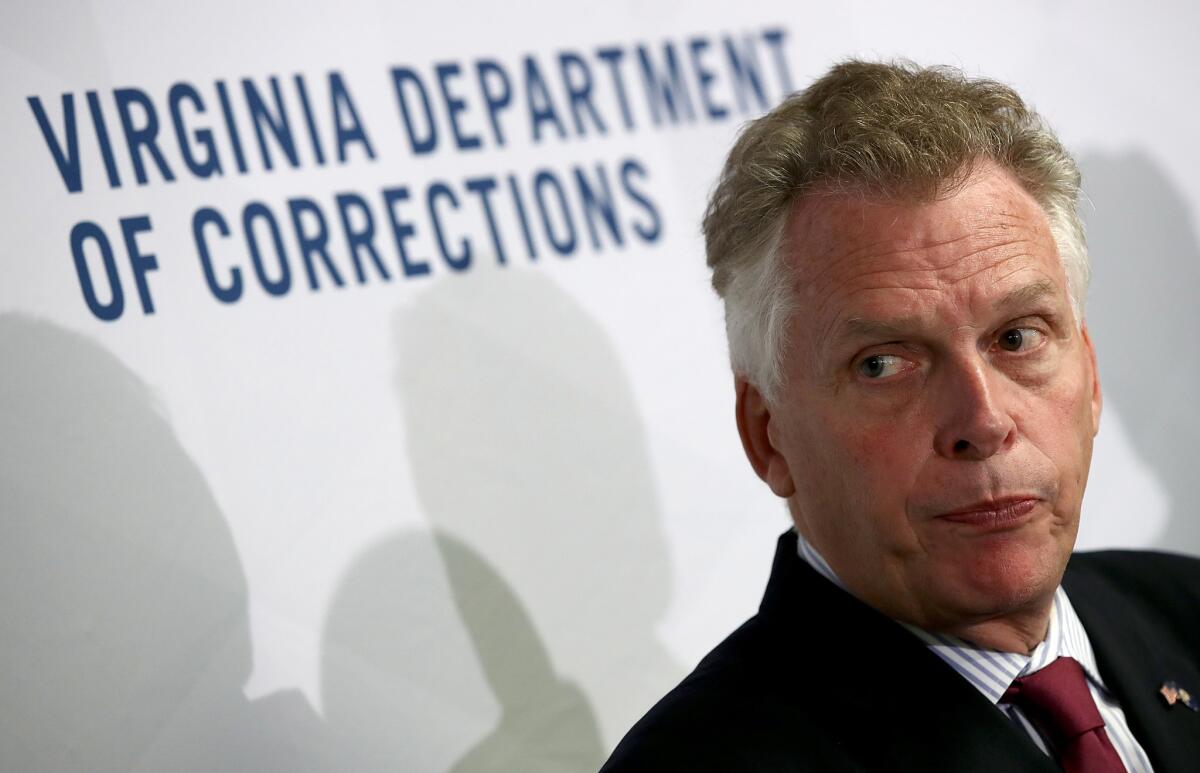Virginia court tosses governor’s order restoring voting rights of felons

Reporting from RICHMOND, Va. — Virginia Gov. Terry McAuliffe’s sweeping executive order restoring the voting rights of more than 200,000 felons is unconstitutional, the state’s highest court ruled Friday, siding with Republican lawmakers who said the Democratic governor had overstepped his authority.
In a 4-3 decision, the Supreme Court of Virginia ordered the state to cancel the registrations of the more than 11,000 felons who had signed up to vote so far under the governor’s April executive order and subsequent orders, which also allowed felons to run for public office, serve on a jury and become a notary public.
Top Republicans, who sued the governor over the order, called it “a major victory for the Constitution, the rule of law and the Commonwealth of Virginia.”
“Our nation was founded on the principles of limited government and separation of powers. Those principles have once again withstood assault from the executive branch. This opinion is a sweeping rebuke of the governor’s unprecedented assertion of executive authority,” House Speaker William Howell and Senate Majority Leader Thomas Norment said in a statement.
Republicans argued that governors cannot restore rights en masse but must consider each former offender’s case individually. Their attorney, Charles Cooper, told the justices during oral arguments Tuesday that the fact that no other Virginia governor had taken such a sweeping action proves the power doesn’t exist.
McAuliffe’s administration and backers countered that there’s nothing in the constitution that says governors must restore a person’s rights on a case-by-case basis.
But the Supreme Court rejected that argument Friday, calling it “overstated at best.”
Republicans accused McAuliffe of trying to add more minorities to the voting rolls ahead of the November election to help his friend Hillary Clinton win the critical swing state of Virginia for the Democrats. Nearly 50% of those whose rights were restored are black, even though African Americans make up just about 20% of Virginia’s population, according to an analysis done by the governor’s office.
McAuliffe denied his action was politically motivated, saying he believes that people who served their time deserve a second chance. He touted his action — which was backed by groups like the Virginia State Conference of the NAACP — as a way to help undo the state’s long history of trying to prevent African Americans from fully participating in the democratic process.
See more of our top stories on Facebook »
McAuliffe said Friday that that he would individually sign the orders restoring felons’ rights, calling it a “disgrace” that Republicans would try to “deny more than 200,000 of their own citizens the right to vote.”
Chief Justice Donald W. Lemons, who wrote the opinion for the court, said the claim that governors can restore rights en masse is “irreconcilable” with the requirement that governors must report to lawmakers the “‘particulars of every case’ and state his ‘reasons’ for each pardon.”
“This requirement implies a specificity and particularity wholly lacking in a blanket, group pardon of a host of unnamed and, to some extent, still unknown number of convicted felons,” Lemons wrote.
The justices emphasized that previous governors had sided with Republicans in the matter, pointing to a letter written by a counselor to Democratic Gov. Tim Kaine in 2010 that said a blanket order restoring voting rights would be a “rewrite of the law.” While the justices accepted McAuliffe’s argument that the novelty of his action doesn’t necessarily mean it’s unconstitutional, they said they considered Republicans’ historical argument to be “highly persuasive.”
ALSO
Hillary Clinton picks Tim Kaine, Virginia senator and former governor, as her running mate
Should felons be allowed to vote from behind bars?
Donald Trump assails effort in Virginia to allow felons to vote
More to Read
Sign up for Essential California
The most important California stories and recommendations in your inbox every morning.
You may occasionally receive promotional content from the Los Angeles Times.










